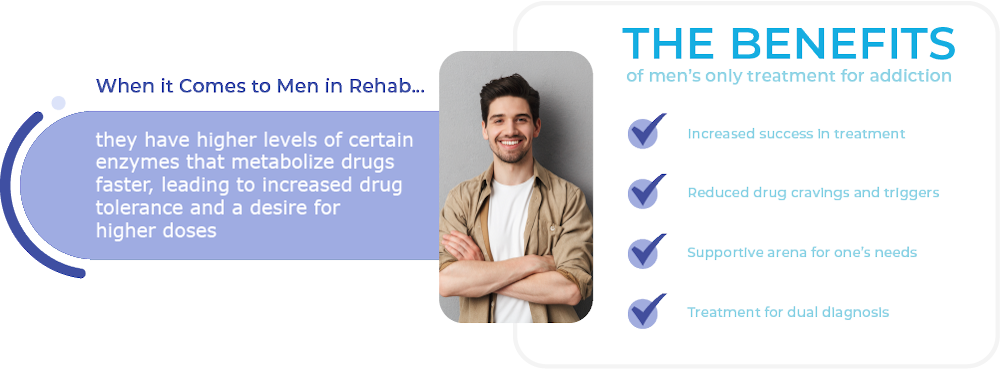Mens Drug Rehab Washington State
Entering rehab after an extended period of substance use and abuse can be pretty intimidating. Most people begin treatment with several problems caused by the cycle of addiction and anxiety, low self-esteem, depression, or other co-occurring mental health conditions.
Clients like this benefit most from a rehab center that provides a program addressing the specific needs of the individual. Men and women seek treatment for different reasons, and there are differences between their lived experiences and addiction. However, treatment for men and women share the same goal: recovery and a life of sobriety and fulfillment.
At Bayview Recovery, we are committed to helping each man or woman in our treatment program find the care and support they need to recover. We take the time to get to know each client so that we can understand what they need to begin the journey to sobriety. Suppose you’re a man looking for support and accountability throughout your recovery. In that case, we welcome you to contact Bayview Recovery’s addiction treatment center in Washington and ask about our program at our men’s rehab center. Let us help you break the cycle of addiction and find the path to recovery.

How Do Men Experience Addiction and Recovery Differently Than Women?
Women and men are both susceptible to substance use disorder, however, there are specific trends in addiction and treatment that affect them both differently. That is why gender-based addiction treatment is important. It helps address these unique differences and helps individuals heal appropriately and target what matters most to them.
Men Suffer From More Severe Consequences Due to Drug Use
The reason why men tend to suffer more severe consequences from substance abuse than women is due to a combination of biological and social factors.
One reason is that men tend to have higher levels of certain enzymes that metabolize drugs faster, leading to increased drug tolerance and a desire for higher doses. Additionally, men tend to use more potent drugs and engage in riskier behavior while under the influence, which can lead to more severe physical and psychological consequences.
Social factors also play a role, as men may be more likely to engage in substance abuse as a means of coping with stress, societal pressures, or trauma. And societal expectations of masculinity may discourage men from seeking help or support when facing addiction or related issues, leading to prolonged suffering and worse outcomes.

Men Are Less Receptive to Addiction Treatment
 One reason is societal expectations surrounding masculinity, which may lead men to feel that admitting to having an addiction is a sign of weakness or failure. This can lead to feelings of shame and reluctance to seek help.
One reason is societal expectations surrounding masculinity, which may lead men to feel that admitting to having an addiction is a sign of weakness or failure. This can lead to feelings of shame and reluctance to seek help.
In addition, men may feel that addiction treatment is not compatible with their work schedules or other daily obligations, leading to concerns about how treatment will impact their livelihoods. This may be especially true for men who work in jobs that are high-pressure, require long hours, or do not offer much sick or vacation time.
Furthermore, research has suggested that men may be more likely to view addiction treatment as stigmatizing, and may be less likely to seek help because of concerns about how others will view them. This may be particularly true for men who belong to certain cultural or ethnic groups, where addiction may be more heavily stigmatized.
Overall, there is a range of social and cultural barriers that may make men less receptive to addiction treatment than women. Addressing these barriers and creating more accessible and stigma-free addiction treatment resources can help men overcome these obstacles and get the help they need.
Benefits of a Men’s Drug Rehab Center
Drug rehab offers many treatments and therapies to help a person achieve sobriety. It can provide individuals with the tools they need to stay sober and resist the temptation to use drugs in the future.
For men, attending treatment can be a difficult change, so treatment teams need to recognize that men will be resistant to therapy. Specialists will need to craft specific treatment plans that address men’s unique needs so that they can get the most out of the addiction treatment experience.
Drug cravings can be incredibly intense and challenging to resist. Drug rehab can help to reduce these cravings, making it easier to stay sober. Triggers are also difficult to manage. A men’s rehab will need to help men identify specific triggers and cravings that they can expect so they can create detailed relapse prevention plans after leaving treatment.
Drug rehab provides a supportive environment where men can focus on their recovery without the distraction of everyday life. This supportive atmosphere can be incredibly helpful in overcoming addiction.
Men’s drug rehab in Washington State focuses on the things that matter to men and helps encourage them to open up by using evidence-based treatment practices like art therapy to help men express themselves without the fear of talking about emotions. This can be incredibly helpful in supporting men’s recovery initiatives.
Many men who struggle with addiction also struggle with mental health conditions such as anxiety or depression. Drug rehab can provide treatment for these co-occurring conditions, improving the chances of recovery.
Men are often unaware that they had been struggling with mental health conditions so professionals will need to work with patients to help them discover these underlying causes of substance abuse. A men’s rehab facility is familiar with this challenge and helps men receive well-rounded treatment that includes mental illness.
Recovery from addiction often improves overall mental health and physical health. Men who achieve sobriety tend to experience lower levels of anxiety and depression and improved self-esteem. They are also able to focus on their physical health and well-being by focusing on nutrition and fitness. Through a men’s rehab in Washington State, patients can get the type of treatment that is paramount to their long-term success in recovery.
Bayview Recovery provides many of what most people would consider standard treatment options. This includes things like individual therapy, group therapy, and family counseling. We also offer several unique amenities and features that help our clients during their time in treatment.

What to Expect from a Men’s Drug Rehab Program
When considering an addiction treatment program, you may want to consider the type of treatment that would work best for you. For instance, some treatment centers only offer evidence-based treatment options. This term means that they only provide treatments that experts in addiction treatment have proven effective.
While these treatments may be efficacious, they aren’t necessarily enough to address all of the addiction’s impacts. Therefore, at Bayview Recovery, we prefer combining evidence-based and holistic therapies. Holistic therapies are treatment options that address addiction’s total impact on the body, meaning its effect on the client’s mind, body, and soul. Using a combination of these therapies makes it more likely that a client will be able to enter long-term recovery.
Our men’s addiction treatment center offers a wide array of therapeutic options, including:
Life skills training
When you contact Bayview Recovery, we will perform a complete evaluation to determine what type of treatment would work best for you. Then, we will create a treatment plan that addresses your challenges as practically and effectively as possible.
What Conditions Can Bayview Recovery’s Programs for Men Address?
Our men’s addiction treatment center is equipped to address a wide array of conditions. For instance, many of the men we treat are battling one of many addictions, such as:

In addition, we recognize that many people struggle with other mental health disorders and addiction. In such cases, we may recommend dual diagnosis treatment. This type of treatment addresses both the mental health concern and the addiction simultaneously. Dual diagnosis treatment effectively gives the clients the support they need to manage their mental health without returning to use. At the same time, the client learns how to manage their triggers and stressors in a way that supports their mental health recovery.
Seek Help at the Drug Treatment Center for Men at Bayview Recovery
At Bayview Recovery, we believe firmly in the concept of creating custom treatment options for each client. We offer a wide range of treatment options tailored to the individual needs of men struggling with addiction. In every case, our goal is to enable our client to live a life of recovery.
Contact Bayview Recovery today to learn how our men’s treatment center in Washington can help you or a loved one start toward recovery, or contact us online.

Dave Cundiff, MD, MPH is an experienced leader in the field of Substance Use Disorder treatment. He works with patients suffering from Substance Use Disorder to evaluate their medication needs and prescribe treatments accordingly. In addition, he regularly participates in all-staff debriefing sessions involving peers, nurses, and other prescribers. He also reviews and advises on policies, procedures, and techniques for treating substance use disorder.




